- Home
- Karen Hawkins
And the Bride Wore Plaid
And the Bride Wore Plaid Read online
KAREN HAWKINS
And The Bride Wore Plaid
CONTENTS
Chapter 1
It was raining. Not a soft, whispering rain, the kind…
Chapter 2
Morning dawned, and with it a fresh, stiff breeze that…
Chapter 3
The chit had kicked him. Hard. Devon’s temper went from…
Chapter 4
To one side of Kilkairn lay a winding river,…
Chapter 5
Devon had always believed that one’s greatest strength was also…
Chapter 6
After riding Thunder another two hours, over hill and through…
Chapter 7
“Ye’re sure ye’re feeling well?”
Chapter 8
“There he is!” Fiona exclaimed.
Chapter 9
Every eye focused on the closed door.
Chapter 10
“He is never here.”
Chapter 11
Tilton held out Devon’s riding coat. “Your coat, sir.”
Chapter 12
Kat was agonizingly aware of Devon throughout lunch. He, meanwhile,…
Chapter 13
Fiona opened the door to the green guest chamber and…
Chapter 14
Life, Devon decided, was a complex proposition. Just when…
Chapter 15
Devon climbed the rest of the way in, stepping over…
Chapter 16
Devon leaned back, the candlelight caressing his face, tracing…
Chapter 17
Devon awoke the next morning to the sounds of tradesmen…
Chapter 18
“Bloody hell,” Devon said woozily. “I’ve died.”
Chapter 19
“Pssh.” Malcolm rubbed his neck and looked at his sister…
Epilogue
A short time later, Devon pulled Kat into his arms and…
About the Author
Other Books by Karen Hawkins
Copyright
About the Publisher
Chapter 1
I pity people who think to fool their fellow man. Take poor Mary Gillenwather. She stuffed the front of her gown with paper in an effort to appear better endowed. We all knew she’d done it, but no one said a word; you simply cannot work that sort of thing into a genteel conversation. But it wasn’t necessary after all. Last night, at the Pooles’ dinner party, she sneezed and dropped an entire issue of the Morning Post into her soup.
Lady Mountjoy to her friend Miss Clarissa Fullerton, while sipping chocolate at Betty’s Tea House
It was raining. Not a soft, whispering rain, the kind that mists the world into a greener, lusher place, but a harsh, heavy deluge that sopped the earth and saturated the very air with unending grayness. Water pooled, collected, swirled, swelled, and then burst into fields, raged through ditches, and rampaged across roads.
It was in this heavy, unending torrent that the lumbering carriage finally reached its destination late at night. The driver and footmen were exhausted, the horses straining heavily as they pulled the mud-coated ornate wheels through the muck and mire that had once been a road.
Ten minutes later, around the curve of a hill, appeared a looming stone castle that stretched up into the blackness of night. The coachman didn’t even bother to wipe the rain from his face as he halted the carriage at the door. Too wet to do more than tilt his hat brim to empty it of whatever water had collected, he squinted at the dark edifice that loomed in front of them. “Gor,” he said softly, awe overwhelming the tiredness of his voice.
Beside him on the seat was Paul the footman, a relatively new arrival to Mr. Devon St. John’s rather considerable staff. Paul was inclined to agree with John the coachman. “Dark, it is. It fair makes me shiver in me boots. Are ye sure we’ve come to the right place?”
“Mr. St. John said to go to Kilkairn Castle and to Kilkairn Castle we’ve come.” The coachman shook his head disgustedly. “Though to tell ye the truth, I think Mr. St. John has bumped his noggin.”
“Why do ye think that?”
“Just look at the facts. First he leaves his own brother’s weddin’ afore it even begins and then he orders us to bring him here, drivin’ through godforsaken rain fer days on end. And when we do get to this lumbering pile of stone, there’s nary a light on!” He sourly regarded the bleak building in front of them. “Looks deserted and hainted by ghosties, if I ain’t mistaken.”
Paul stood, stealing yet another glance at the dark edifice before them. While he wasn’t a great believer in ghosties, the castle definitely left him with an uneasy, spine-tingling sensation that was as unnerving as the constant pour of rain.
Biting back a sigh, Paul made his way down from the seat, landing in a huge puddle of muck that sank his wet boots up to his ankles. “The drive’s a rank mess.”
“I only hopes they’ve a barn, though I daresay it is as leaky as a sieve, judging from the looks of things. Didn’t they knowed we was comin’?”
“They was tol’. I posted the letter for Mr. St. John meself.” Paul tugged his hat lower, though it was so wet it no longer protected him from anything the elements had to offer. He hoped the owner of the castle was not as ramshackle as his edifice and had a place prepared for them all.
Holding this warming thought in place, the footman trudged back to open the door for his master, stopping to collect a lantern from a side hook. It took a while to get the blasted lamp lit.
He carried the lantern to the door and hung it on a hook there, the golden pool of light greatly diminished by the weather. He tugged on the door handle, opened it, and then let down the steps.
Inside the plush carriage sprawled a long, elegant figure dressed in a well-fitted coat and breeches, sparkling top boots, and a perfectly starched and folded cravat, set with a blue sapphire. The jewel echoed the master’s blue eyes in an uncanny manner. There was no mistaking a St. John—black hair and blue eyes, a square, determined chin, and a sharp wit marked them all.
At the moment, though, Paul couldn’t make out his master’s face in the shadows, which left him momentarily anxious. Though it was rare that Mr. St. John took an irritation, he could be cold and cutting when occasion called for it. Paul cleared his throat. “Mr. St. John, we have arrived at Kilkairn Castle.”
The figure inside stirred, stretching lazily. “It’s about time. I fear I had fallen into a stupor when—good God!” Mr. Devon St. John’s blue eyes widened as he looked at Paul. “You’re drowned!”
“Just a bit wet, sir.”
“That is an understatement if I’ve ever heard one. Go ahead and say it—it’s wretched, horrid, awful, godforsaken rain and you wonder why we’re arriving so late at night.”
Paul hesitated, then nodded. “Aye, sir. All that and more.”
“Indeed,” the master said. “The reason I pushed us so hard was because I mistakenly thought we’d be able to outrun the family curse.”
“Curse, sir?”
“The St. John talisman ring. It’s a curse if there ever was one. It seems that whoever holds the bloody thing is doomed to wed.”
Paul had heard of the St. John talisman ring, and it sounded horrid indeed. “Do ye hold the ring, sir?”
“Unknowingly, I’ve held it since before we left England. My brother Chase hid it in the blasted carriage. He must have known I’d flee before the wedding, the bastard. I didn’t discover it until we were well on our way.”
Paul shook his head. “Then ye’re doomed.”
St. John smiled, a peculiarly sweet smile, one that made Paul stand a little straighter despite his tiredness and the wetness that trickled down his back. “Like hell I’m doomed. I was not made for marriage.
Not now, not ever. I’m afraid the fates will have to wait a few weeks to deliver their verdict.”
“Weeks, sir?”
“Until I can get this blasted ring into my oldest brother’s hands. Marcus is the last of us to remain unwed other than myself.”
“God help him then, sir. Marriage is a horrible thing indeed.” Paul shuddered, thinking of all the near misses he’d had. “I don’t envy you, sir.”
The master’s blue gaze twinkled. “I don’t envy myself, Paul. At least not on this occasion.”
Not a single one of Paul’s previous employers had bothered to remember his name, so he was impressed that Mr. St. John had bothered to do so. Not that his new master was overly familiar in any way; he wasn’t. He might stand for an occasional exchange of quips, but he brooked no nonsense when it came to disrespect, thievery, or slovenly behavior.
It was that special combination of familiarity and stern but fair grace that made Paul and all the other servants loyal unto death for Mr. Devon St. John. It was well known throughout the servant circles in London that there was no more plum spot to work. Had Mr. St. John’s last footman not succumbed to an unfortunate stomach complaint that had turned fatal, Paul would not now be in such a wondrous position. Even with the rain, he could scarcely believe his luck.
Smiling, Paul opened the door wider. “The rain has let up, so ye shouldn’t get too wet.”
“Thank God.” St. John placed his hat over his black hair, grimacing as he stepped into the thick mud. “Tipton will be appalled when he beholds my lovely new boots.”
Tipton was Mr. St. John’s valet, and a more starched, outraged person Paul had yet to meet. “Indeed, sir. Wouldn’t surprise me a bit if the sight of yer boots don’t put him to tears.” Paul grabbed the lantern and held it aloft to light the way as they proceeded to the large wooden doors.
“I am sure Tipton will not hesitate to tell me what he thinks of the mud upon my boots. He has a tongue in his head that could scorch your soul if you were so silly as to bare it.”
They reached the portico and stepped beneath the overhang, the rain dripping steadily behind them. St. John stood on the covered steps and frowned up at the stone castle. “Bloody hell, the place looks deserted. Is no one up?”
Paul set aside the lantern and went to the large knocker. “Per’aps they thought ye’d be delayed ’cause of the rain. I’ll knock and see if we can’t rouse someone.” He grasped the knocker firmly and rapped. After several more raps, each progressively harder, a light finally appeared between the cracks of the large oak doors.
After what seemed an eternity, the door creaked open to reveal a rather scrawny-looking woman wearing a coat hastily donned over a night rail, large unlaced boots sticking out from beneath the hem. An assortment of keys hanging about her neck on a cord proclaimed her the housekeeper.
She stood in the opening, a brace of candles in one hand, her thick, gray braid flopped over one shoulder, squinting at the two men as if they were gargoyles come to life. “What do ye want?” she asked in a thick Scottish brogue.
“Is this Kilkairn Castle?” Paul asked in a haughty voice that made Devon smile.
“Indeed ’tis. And who might ye be?”
The footman drew himself up to his most impressive height and announced, “Mr. Devon St. John to see Viscount Strathmore.”
The housekeeper’s gaze traveled from Paul to Devon. After a grudging moment, she stepped out of the doorway and motioned for them to follow her. “I don’t know any St. Johns, but ye’re welcome to step inside a bit whilst we sort it out.” She set about lighting the lamps in the hallway, muttering as she went. “Where is that blasted butler? Never where he should be, that’s where.”
James, one of the St. John underfootmen, came with the luggage. Devon watched as James stacked the valises beside the door, bowed, then left. Really, it had been a simple plan—all Devon had wished to do was leave England for a few weeks. A few simple weeks, and all would be well.
But fate was not cooperating. First the rain, then he’d found that blasted ring hidden among the carriage blankets on the seat, and now no one was awake to greet him at Kilkairn Castle. What was supposed to be a haven was rapidly becoming something quite different.
Devon met the minatory stare of the housekeeper and managed a smile. She sniffed and turned away. Devon had to hide a grimace of his own as he gave the castle a quick appraisal. They were not in a foyer, but a great hall of some sort. Heavy timbers hung overhead, while stone made up the outer wall. In contrast, the inner walls were heavily plastered and hung with battle antiquities, augmented by a scattering of standing sets of armor.
But what stood out the most was the fact that the whole room was thick with dust, a faint musty odor permeating the air. Two mismatched chairs stood by the fireplace, one sporting a broken arm. One of the tables by the entryway had a dirty glass left on it, the scent of soured wine evident even from where Devon stood. And the rugs were ashy in color as if it had been years since they’d been cleaned.
James brought the last of the baggage, bowed, and then left.
“Whot’s this?” the housekeeper demanded, her affronted gaze on the pile of valises.
“I wrote to Viscount Strathmore,” Devon said coolly, deciding he was too tired to deal with impertinent servants. “He is expecting me. I assume you have a place for my servants and horses?”
The housekeeper’s sullen expression did little to assure him. Devon stifled a sigh and turned to Paul. “Return to that inn we passed down the road. Have you money enough left for room and board for yourself and the others?”
“Yes, sir. Of course.”
Devon nodded. He was not a man who was miserly with his blunt. When the time came to spend it, he spent it and regretted not a penny. “Thank you, Paul. Return in the morning, then.”
“Yes, sir. At ten?”
Devon’s brows rose. “I said in the morning. My morning will not begin until well after noon.”
Paul managed a reluctant smile. “Yes, sir.”
“And Paul…”
“Sir?”
“See to it that everyone gets a hot meal and all the ale they can hold. We made excellent time, and I am most grateful.”
Paul brightened. “Yes, sir.” He bowed, sent a sharp glance at the sulking housekeeper, and then left, the door closing behind him with an ominous thunk.
Devon shrugged out of his wet coat. Thank God he was only staying for three weeks before continuing on to see to some business for Marcus. “May I ask when Lord Strathmore is expected?”
“Expected? Why, he’s here now.”
Devon couldn’t help glancing back at the shambling state of affairs in the main room. From what he remembered of Malcolm Macdonald from their school days, this disorganization was a bit of a surprise. What had caused Kilkairn Castle to be in such a state of disarray?
The housekeeper harrumphed, the keys about her neck jangling. “I wisht Davies was here.”
“Davies?”
“The butler.”
“Ah.”
The housekeeper made a face. “The wretch is off a-sleepin’ somewheres, if I know him.”
Devon immediately had an image of an elderly individual reeking of gin.
“I suppose ye’ll be wantin’ a room to sleep in.”
“Please,” Devon said, removing his gloves and laying them, with his wet coat, on the table in the entryway, ignoring the thick layer of dust that was sure to cling to the fine wool. “And some food, if it is not too much trouble.”
The housekeeper shook her head. “There’s nary a crumb to be had till breakfast. Cook locks up the larder each night.”
Wonderful. Devon began to think, with something akin to envy, of his servants holed up in that dry, snug inn. “Just a bed, then. My valet will be arriving shortly in another coach.”
“Och dearie! Ye brought a valet? Whotever for? This isn’t Edinburgh, ye know.” The housekeeper scratched her chin. “Ye’ll be needin’ a room, won’t ye? Blast Dav
ies fer dodgin’ his duties.”
Devon swallowed a sigh. “I’m certain you know better than he which rooms are ready and which aren’t.”
That appeared to mollify her some, for she nodded. “’Tis unlikely the gold chamber is ready, though it might do in a pinch. Mayhap the green one isn’t too bad off. I suppose we can put yer man—”
“I wrote Strathmore last week,” Devon broke in, a little frustrated. “He should have received my letter stating the date of my arrival and—”
“Don’t ye fash’ ’bout His Lordship. I’m sure he forgot aboot it, whot with—” The housekeeper clamped her mouth closed, as if swallowing something unpleasant. Devon waited, but she just looked away. That was interesting. What was happening at Kilkairn Castle? Devon wondered if perhaps he’d made an error in coming to Scotland after all.
The woman sighed. “Come with me, if ye please. Let’s find ye somewhere to sleep.” She picked up one of the lamps and began walking up the stairs, not once glancing over her shoulder to see if Devon followed or not. “No one ever said whist to me aboot a visitor, and I’ve too much to do to go guessin’ as whot needs to be done and whot doesn’t. I suppose we’ll make a go fer the green chamber first and see if ’tis clean enough. I’d put ye in the gold chamber, but the sheets haven’t been turned in I don’t know how long and…” She rambled on and on, only pausing for a quick breath now and again.
Devon followed her up the stairs, realizing with each step just how tired he was. His back ached from traveling so far, his shoulders were stiff, and his temper was wearing thinner by the second.
They reached the landing and walked down what seemed an interminable length of dark, dank hallway before the housekeeper stopped. She held the lamp high and opened a large oak door. Thick, dusty air crept around them. Devon looked about the large chamber and noted that not only was the fire unlit, but a swath of cobwebs stretched in every corner. Worse, there was a damp spot beside the window, the rug black where water had seeped.

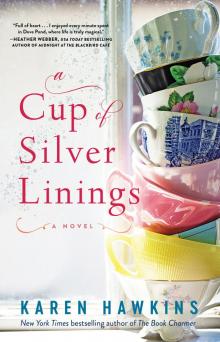 A Cup of Silver Linings
A Cup of Silver Linings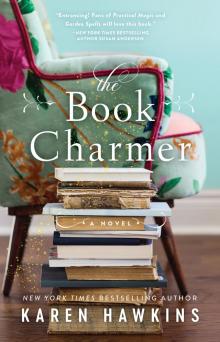 The Book Charmer
The Book Charmer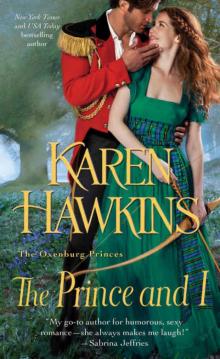 The Prince and I
The Prince and I![Duchess Diaries [2] How to Pursue a Princess Read online](http://i1.bookreadfree.com/i/03/12/duchess_diaries_[2]_how_to_pursue_a_princess_preview.jpg) Duchess Diaries [2] How to Pursue a Princess
Duchess Diaries [2] How to Pursue a Princess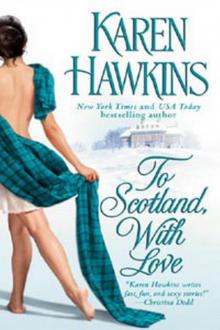 To Scotland, With Love
To Scotland, With Love Her Master and Commander
Her Master and Commander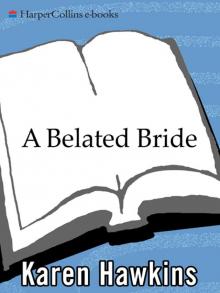 A Belated Bride
A Belated Bride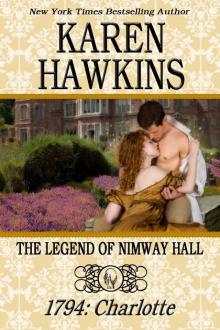 1794_Charlotte
1794_Charlotte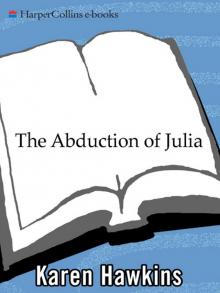 The Abduction of Julia
The Abduction of Julia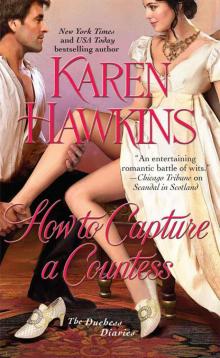 How to Capture a Countess (Duchess Diaries 1)
How to Capture a Countess (Duchess Diaries 1)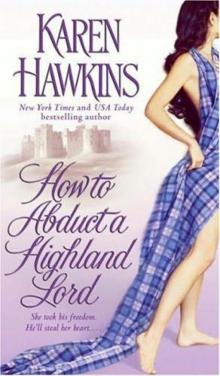 Karen Hawkins - MacLean 1 How to Abduct a Highland Lord
Karen Hawkins - MacLean 1 How to Abduct a Highland Lord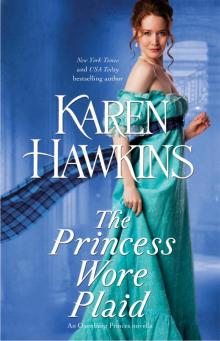 The Princess Wore Plaid
The Princess Wore Plaid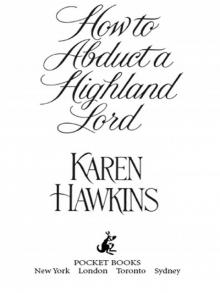 How to Abduct a Highland Lord
How to Abduct a Highland Lord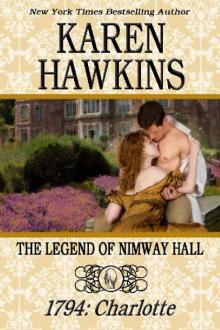 THE LEGEND OF NIMWAY HALL: 1794 - CHARLOTTE
THE LEGEND OF NIMWAY HALL: 1794 - CHARLOTTE Caught by the Scot
Caught by the Scot The Lady in the Tower
The Lady in the Tower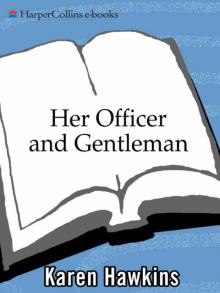 Her Officer and Gentleman
Her Officer and Gentleman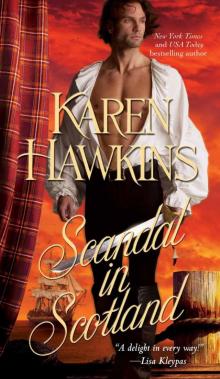 Hurst 02 - Scandal in Scotland
Hurst 02 - Scandal in Scotland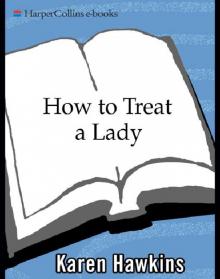 How to Treat a Lady
How to Treat a Lady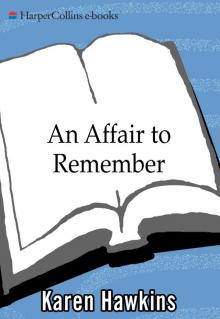 An Affair to Remember
An Affair to Remember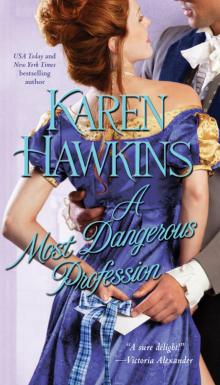 A Most Dangerous Profession
A Most Dangerous Profession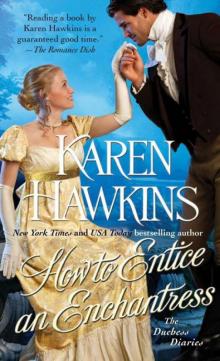 How to Entice an Enchantress
How to Entice an Enchantress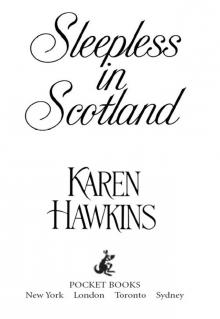 The MacLeans: Sleepless in Scotland
The MacLeans: Sleepless in Scotland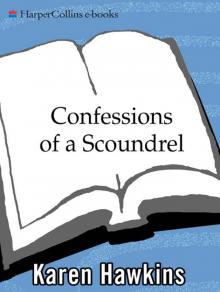 Confessions of a Scoundrel
Confessions of a Scoundrel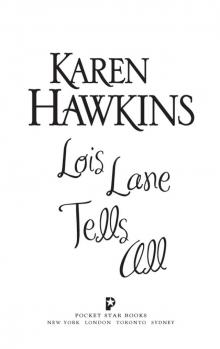 Lois Lane Tells All
Lois Lane Tells All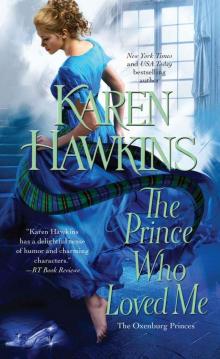 The Prince Who Loved Me (The Oxenburg Princes)
The Prince Who Loved Me (The Oxenburg Princes)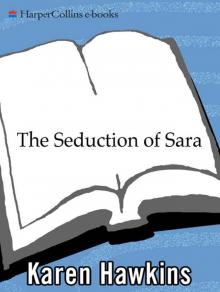 The Seduction of Sara
The Seduction of Sara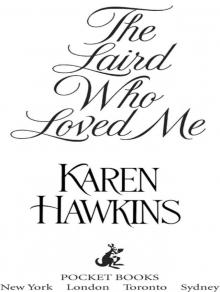 The Laird Who Loved Me
The Laird Who Loved Me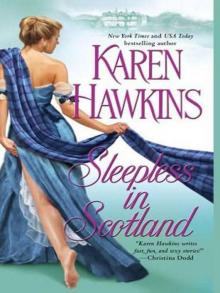 The MacLeans - Sleepless in Scotla
The MacLeans - Sleepless in Scotla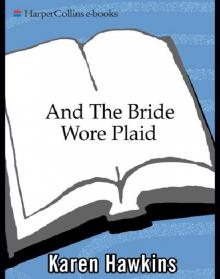 And the Bride Wore Plaid
And the Bride Wore Plaid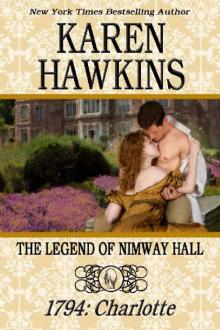 THE LEGEND OF NIMWAY HALL_1794_CHARLOTTE
THE LEGEND OF NIMWAY HALL_1794_CHARLOTTE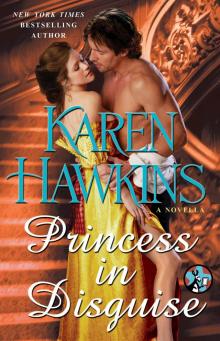 Princess in Disguise
Princess in Disguise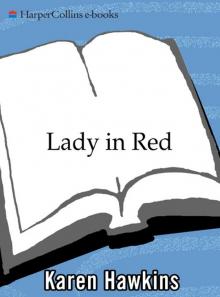 Lady in Red
Lady in Red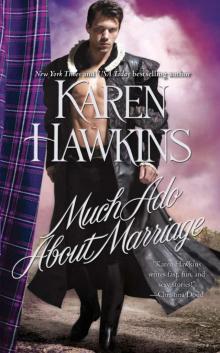 Much Ado About Marriage
Much Ado About Marriage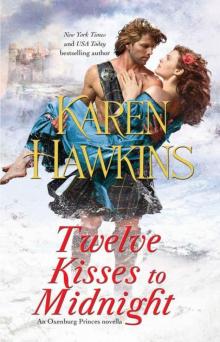 Twelve Kisses to Midnight: A Novella (The Oxenburg Princes)
Twelve Kisses to Midnight: A Novella (The Oxenburg Princes)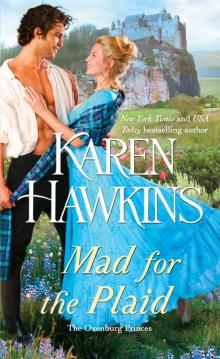 Mad for the Plaid
Mad for the Plaid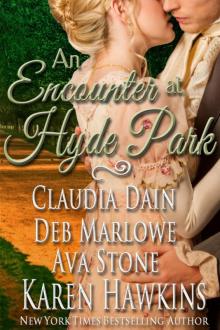 An Encounter at Hyde Park
An Encounter at Hyde Park